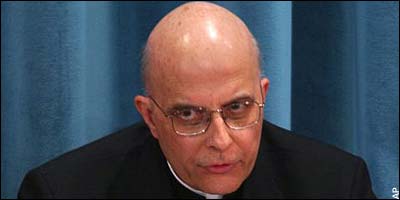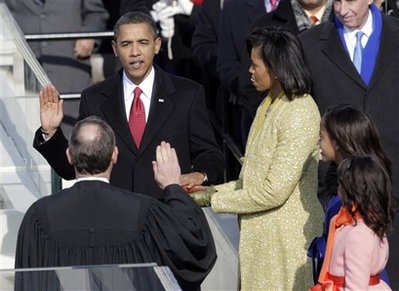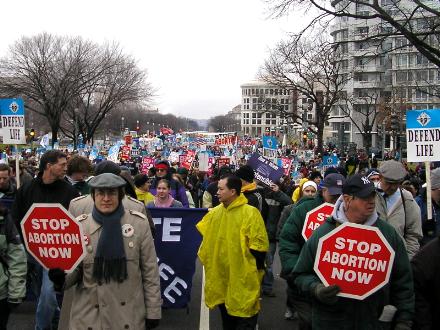 So the Catholic hierarchy in the U.S., through its president, Chicago Cardinal Francis George, welcomes the incoming President-elect just before his inauguration with a respectful, constructive letter, dated Jan. 13, setting out hopes for collaboration and working together on a range of issues, including the pro-life agenda. Notably, Cardinal George did not refer to the Roe decision, and proffered a commitment to working together on policies to “reduce the number of abortions.”
So the Catholic hierarchy in the U.S., through its president, Chicago Cardinal Francis George, welcomes the incoming President-elect just before his inauguration with a respectful, constructive letter, dated Jan. 13, setting out hopes for collaboration and working together on a range of issues, including the pro-life agenda. Notably, Cardinal George did not refer to the Roe decision, and proffered a commitment to working together on policies to “reduce the number of abortions.”
It sure seemed like folks with some political savvy–which the hierarchy did not demonstrate during the election campaign–got to the leadership with some words of wisdom about political realities, and what to fear and who not to fear, and how best to advance the cause. The Jan. 13 letter was a marked shift from the tone and substance of George’s immediate, flat-footed, ham-handed post-election statement regarding Obama.
 But wait! The day before Inauguration Day came word of a follow-up letter from George to Obama on Jan. 16, in which he warned the incoming president not to reverse Bush policies on abotion funding or stem cells, saying they “could introduce significant negative and divisive factors into our national life, at a time when we need to come together to address the serious challenges facing our people.”
But wait! The day before Inauguration Day came word of a follow-up letter from George to Obama on Jan. 16, in which he warned the incoming president not to reverse Bush policies on abotion funding or stem cells, saying they “could introduce significant negative and divisive factors into our national life, at a time when we need to come together to address the serious challenges facing our people.”
Compare that all to the markedly different tone from Rome. A nice telegram from the Pope; an inauguration commentary in L’Osservatore Romano comparing Washington to Berlin in 1989 with the fall of the Berlin Wall; and a Vatican Radio interview with Rick Garnett of Notre Dame who, according to Catholic World News, “commented on the new president’s openness to religion and predicted that under his leadership, the United States would continue to be less secularist than many European nations.”
What does it all mean? First, that the bishops–whose deo internal divisions were exposed during the campaign–are still struggling to find a strategy and a voice to deal with the new political reality. Second, it’s easy for the Vatican to make nice. The local bishops are the point men who have to deal with the Administration on policy questions. Third, George’s tone, while still seeming to come from between clenched teeth, was a good deal more constructive even in the follow-up letter than the November statement and the comments from other bishops and much of the pro-life community.
Reality is being to take hold. The final question is whether this is too little, too late. There is still so little recognition of the historic moment of Obama’s election, little sense of joy or any emotion, or appreciation of the prospect of the end of a terrible policies on torture and such. The bishops seem like such bystanders to this moment.
And there’s a danger that if they don’t get their act together, they may remain so.
More from Beliefnet and our partners

